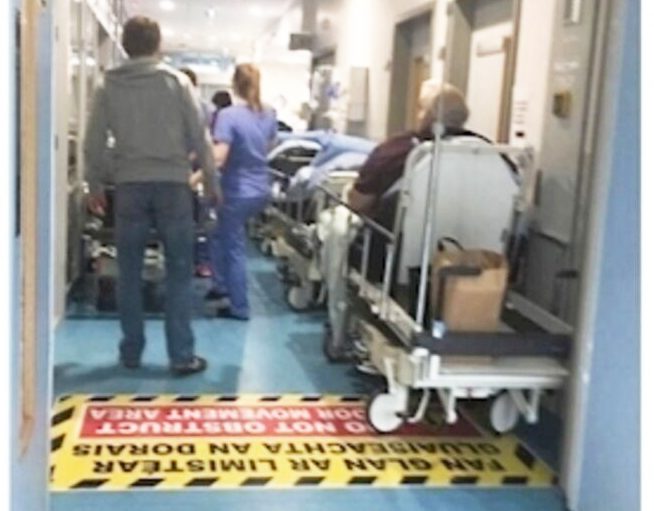
AN INDEPENDENT review team, which visited the emergency department at University Hospital Limerick (UHL), found patients who had been admitted were waiting almost three days – 65 hours – for a bed in the hospital.
The 2019 Independent Review of Unscheduled Care Performance report into practices in nine HSE-run hospitals across the country – and which the HSE decided not to publish in the wake of Covid-19 – was recently released to the Irish Patients Association under Freedom of Information, and was seen in detail by the Limerick Post.
On the day of the team’s visit to UHL (October 9, 2019) some patients had been waiting 65 hours for an in-hospital bed, although there were just 40 patients waiting for admission, a situation described by staff as “a good day”.
The team found patients were waiting in corridors in the main emergency department areas. “The corridor patients had no privacy. Corridor nursing in emergency department
is unsatisfactory because of poor visibility, and consultants are often unaware of who is waiting in corridors nominally under the care of the admitting specialist consultant.”
The report said: “The medical model needs to be re-examined. There was widespread permissive boarding – any bed, anytime, anywhere, even and including mixed gender. This does not create extra capacity but increases length of stay and risk.”
Other concerns were raised about the need for seven-day diagnostics so patients can be discharged even at weekends, the lack of ward-based therapy teams/social workers, and patients being kept on trolleys in the Acute Medical Unit “despite the fact that this area is managed as a ward and many patients have protracted stays”.
The Acute Surgical Unit (ASU) practice of having the last dedicated theatre slot at 5.30pm “regardless of the pressures in the emergency department” was a worry.
The report said that overall “the review team experienced strong nurse leadership and committed patient care with a focus on quality and patient safety. However, the hospital is clearly under pressure with regard to unscheduled care”.
The report was compiled under Professor Frank Keane, former president of the Royal College of Surgeons Ireland.
In a statement, the HSE said that the report is “outdated. The arrival of the Covid-19 pandemic in March 2020 required the HSE to respond to the extraordinary challenges posed and in doing so resulted in the implementation of structures and initiatives to address many of the issues and recommendations that were identified in the draft report.
“The review as undertaken in 2019 has limited if any material benefit to be considered today as a basis for implementation, particularly given the action plans in place to address our current and future challenges.”
Stephen McMahon, co-founder of the IPA said: “There is a culture at the top of the HSE which sets up the conditions for error and mishap due to poor systems design, leadership, oversight, and intent on implementation, which is at the core of Sláintecare.
“This issue clearly points to a lack of appetite for engaging in meaningful reform from the top and a narrow focus on capacity and resource without attending to the many other elements which impact performance.”
He said the decision not to publish the report “highlights a culture of secrecy, indeed a lack of respect towards other stakeholders”.
In a recent open letter to Health Minister Stephen Donnelly, he said: “ You are well aware of our long-standing view on the need for management to be regulated in the same way as medical and allied professionals. In addition, corporate and clinical governance must move beyond a comfort-seeking way of working and closing their eyes, to one of being attuned to a keen sense of problem-sensing and putting solutions in place.
“The days of commentating on problems by those remunerated and charged with solving them must be called out and stopped.
“Patients everywhere in Ireland deserve better, much better, performance. We can all play an important role in bringing real reform to our health services.”
Meanwhile, the Irish Nurses and Midwives organisation (INMO) said that the HSE “cannot hide behind Covid as a reason not to publish independent reports into the health service”.
“Since the Chief Operations Officer wrote that Covid has deemed an independent review into overcrowding into nine of our most overcrowded hospitals in the country as not relevant, over 106,813 patients have been without a bed in Irish hospitals.
“We know that if a patient is on a trolley for more than five hours it can have a significant detrimental impact on their health and indeed their mortality.
“Covid has made the recommendations in this independent review even more pertinent, with the authors of the report calling for a review of infection prevention and control measures to be carried out.
“This was a problem pre-Covid and one we are facing now in extremely overcrowded hospitals, where Covid infections rates are high and the practice of placing “any bed, anywhere, anytime” continues despite the clear consequences for patients and staff,” concluded the INMO spokesperson.


